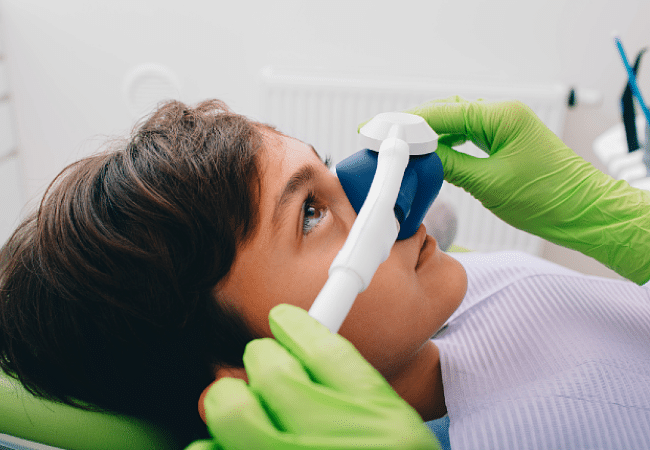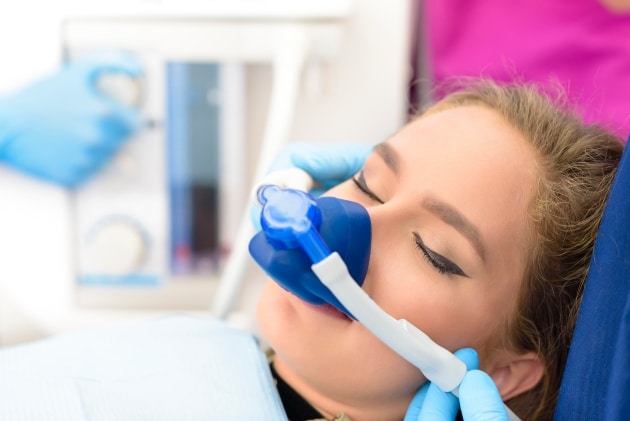At our Seattle dentist practice, we understand the challenges that dental anxiety presents, and we are committed to providing a comfortable and reassuring experience.
Dental anxiety is a state of apprehension, anxiety, or fear produced by the thought of an impending dental appointment. If going to the dentist makes you anxious or scared, you are not alone.

Overcome Their Dental Anxiety
Dental fears are very common (according to the World Health Organization (WHO), 15-20% of the population suffers from dental phobia or anxiety) and, here at Innovative Dentistry, we genuinely enjoy helping individuals overcome their dental anxiety and truly enjoy their visits.
Whether your fear is mild to severe, we will not judge the condition of your teeth and gums. Your health is our priority and we are genuine in saying we’re happy you’re taking the steps toward it. We’re here to help you achieve the smile you’ve always wanted!
Dental Anxiety Causes
The causes of dental anxiety are related to factors such as direct or indirect negative experiences with dental care, fear of pain, embarrassment, personal space, side effects of anesthesia, loss of control, and fear of injections, needles, or tools.
People with dental anxiety may experience sweating, racing heartbeat, palpitations, low blood pressure, possible fainting, visible distress, crying, signs of panic, withdrawal, or using humor or aggression to mask anxiety.

Don't Let Your Dental Anxiety Win
We encourage you to not let your dental anxiety win. It can lead to untreated dental problems and poor oral health. It can also affect your self-confidence and relationships:
- Poor Dental Hygiene: People with dental anxiety may avoid going to the dentist, which can lead to poor dental hygiene. Poor dental hygiene can cause tooth decay, gum disease, and other oral health problems.
- Delayed Dental Care: People with dental anxiety may delay seeking dental care, which can lead to more extensive and costly dental treatments in the future.
- More Missing Teeth: Studies have shown that people with dental anxiety have more missing teeth than those without dental anxiety.
- Vicious Cycle: Dental anxiety can lead to delayed dental care, which can cause dental deterioration. This can lead to increased dental anxiety and the need for more dental treatment, which can get very costly for you.

Sedation Treatment Help Ease Dental Anxiety
However, there are ways to manage dental anxiety. Exposure therapy, guided imagery, and relaxation techniques can reduce anxiety and improve your quality of life. Sedation options are also available to help ease dental anxiety.
Your Sedation Options for Dental Anxiety:
Nitrous Oxide – Nitrous oxide is provided through a nose hood and is administered throughout the entire procedure. Nitrous oxide elevates the general mood and can evoke an overall sense of well-being. Most importantly, it relieves anxiety and reduces pain during the procedure. You are able to drive yourself to and from each appointment when nitrous oxide is used.
Oral Conscious Sedation – Oral medication is provided before treatment, and then nitrous oxide is added to induce a more profound state of sedation. You are still “awake,” but your senses are dulled. This means that most patients cannot remember the pain, smells, or noises associated with the dental procedure. You will need a driver to and from the appointment when oral medication is used.
IV Sedation – Patients who have previously experienced IV sedation report feeling like they slept through the entire procedure. A treatment taking several hours will feel like minutes when you are sedated. This type of sedation is typically used for longer procedures or more complicated oral surgeries, but can also be used for simple fillings or even cleanings. You will need a driver to and from the appointment with IV sedation.

In Conclusion
It is important to discuss your dental anxiety with our Seattle Dentist and find the best strategy or combination of strategies that work for you. By managing dental anxiety, you can receive the dental care you need to maintain good oral health.


